As human beings, it is natural for us to have a wide range of emotions and experiences. However, when our thoughts, feelings, and behaviors start to deviate from what is considered normal or healthy, we enter the realm of abnormal psychology.
Abnormal psychology refers to the study of psychological disorders, their causes, symptoms, and treatment methods. These disorders can affect anyone, regardless of age, gender, race, or ethnicity, and can range from mild to severe.
In this article, we will explore some of the most common psychological disorders that fall under the category of abnormal psychology and provide a deeper understanding of the mind through these conditions.
Anxiety Disorders
Anxiety disorders are characterized by excessive worry, fear, and apprehension. People with anxiety disorders often experience physical symptoms such as heart palpitations, sweating, and trembling, which can lead to avoidance behaviors and impaired functioning.
Some common types of anxiety disorders include generalized anxiety disorder, panic disorder, and social anxiety disorder. Cognitive-behavioral therapy (CBT) and medication are often used in the treatment of anxiety disorders.
Mood Disorders
Mood disorders refer to a group of disorders that affect an individual’s emotional state. These disorders include major depressive disorder, bipolar disorder, and dysthymia.
Major depressive disorder is characterized by feelings of sadness and hopelessness that persist for a prolonged period of time. Bipolar disorder, on the other hand, involves alternating periods of intense highs (mania) and lows (depression). Dysthymia is a milder form of depression that lasts for at least two years.
Treatment for mood disorders often involves a combination of medication and therapy. Antidepressants and mood stabilizers are commonly used to manage symptoms.
Personality Disorders
Personality disorders are a group of disorders that affect an individual’s thoughts, behaviors, and emotions. People with personality disorders often have difficulty with impulse control, relationships, and self-image.
Some common types of personality disorders include borderline personality disorder, narcissistic personality disorder, and antisocial personality disorder. These disorders can be difficult to treat, but psychotherapy can be effective in improving symptoms and emotional regulation.
Schizophrenia
Schizophrenia is a severe mental disorder that affects an individual’s ability to think, feel, and behave clearly. People with schizophrenia often experience hallucinations and delusions, and they may have difficulty with social interactions and self-care.
Treatment for schizophrenia typically involves a combination of medication, therapy, and support services. Antipsychotic medications can help manage symptoms such as hallucinations and delusions.
Eating Disorders
Eating disorders are a group of disorders that involve harmful eating habits and patterns. Some common types of eating disorders include anorexia nervosa, bulimia nervosa, and binge-eating disorder.
Anorexia nervosa is characterized by an intense fear of gaining weight and a distorted body image. Bulimia nervosa involves binge-eating followed by purging behaviors such as vomiting or using laxatives. Binge-eating disorder involves eating large amounts of food in a short period of time, often accompanied by feelings of guilt and shame.
Treatment for eating disorders involves a multidisciplinary approach that includes therapy, medication, and support groups.
Conclusion
In summary, abnormal psychology encompasses a wide range of psychological disorders that affect individuals in various ways. While these disorders can be challenging to treat, they can also provide valuable insights into the human mind and behavior.
If you or someone you know is struggling with a psychological disorder, it is important to seek professional help. With the right treatment and support, it is possible to manage symptoms and improve overall quality of life.



